Discover the best health tracking apps for 2025 with in-depth reviews, key features, and privacy tips to help you choose confidently.
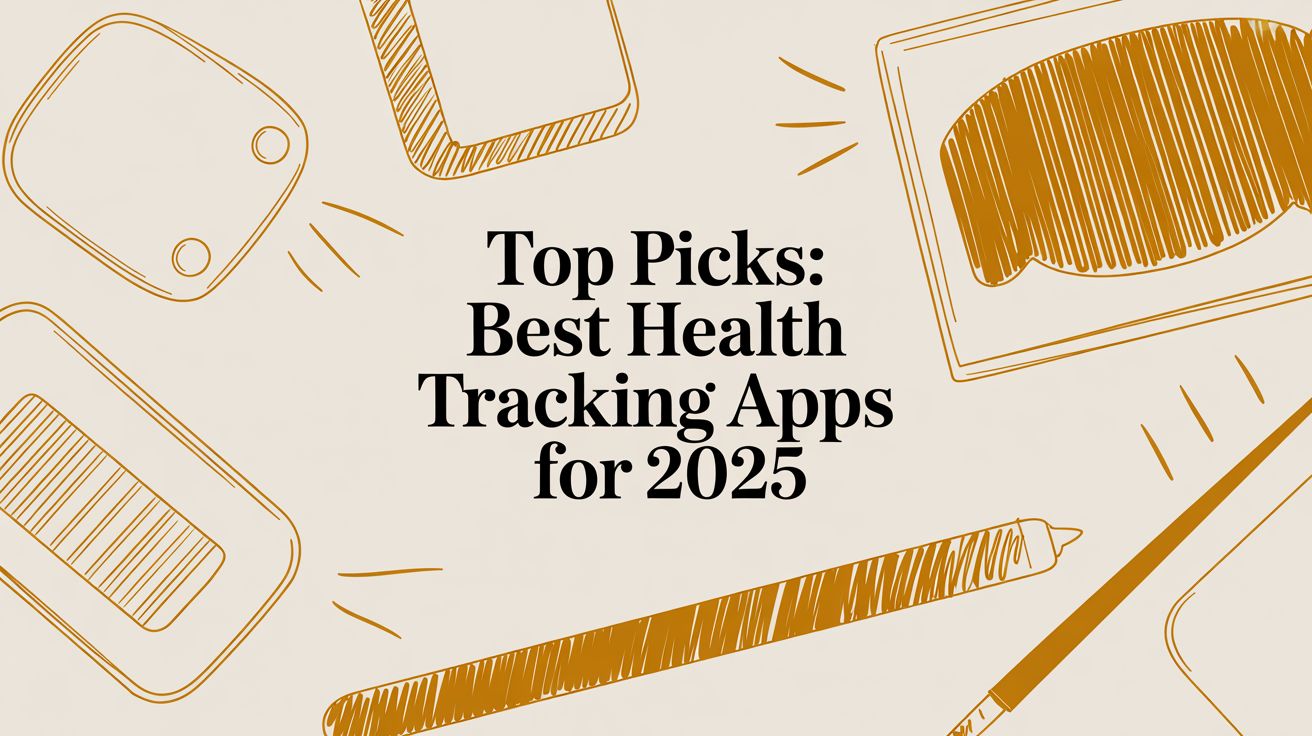
The world of health monitoring has evolved far beyond simple step counters. Today, the best health tracking apps serve as personalized guides, translating complex data from your wearables, meals, and even your bloodwork into actionable daily insights. However, with thousands of options flooding the Apple App Store and Google Play Store, finding the right tool to manage your wellness can be overwhelming. This guide cuts through the noise to highlight 12 exceptional apps designed to help you monitor and improve your health, with a special focus on heart-healthy habits and biomarker integration.
We will explore how these platforms can help you build sustainable routines, guided by recommendations from leading health organizations like the American Heart Association. Each review includes a practical analysis, screenshots, and direct download links to help you make an informed decision. Our goal is to help you find the perfect app for your specific needs, whether you're tracking nutrition, managing a condition, or simply aiming for better overall well-being.
Disclaimer: This article is for informational purposes only and is not a substitute for professional medical advice, diagnosis, or treatment. Always consult with a qualified healthcare provider before making any significant changes to your lifestyle, diet, or health regimen.
HeartFit (heartfit.ai) secures its position as a standout among the best health tracking apps by uniquely bridging the gap between clinical health data and everyday behavior. It is designed for individuals who have specific health recommendations, such as those from a Function Health Action Plan or a cardiologist, and need a practical system to implement them consistently. The platform excels at transforming complex goals into a simple, motivating daily process.
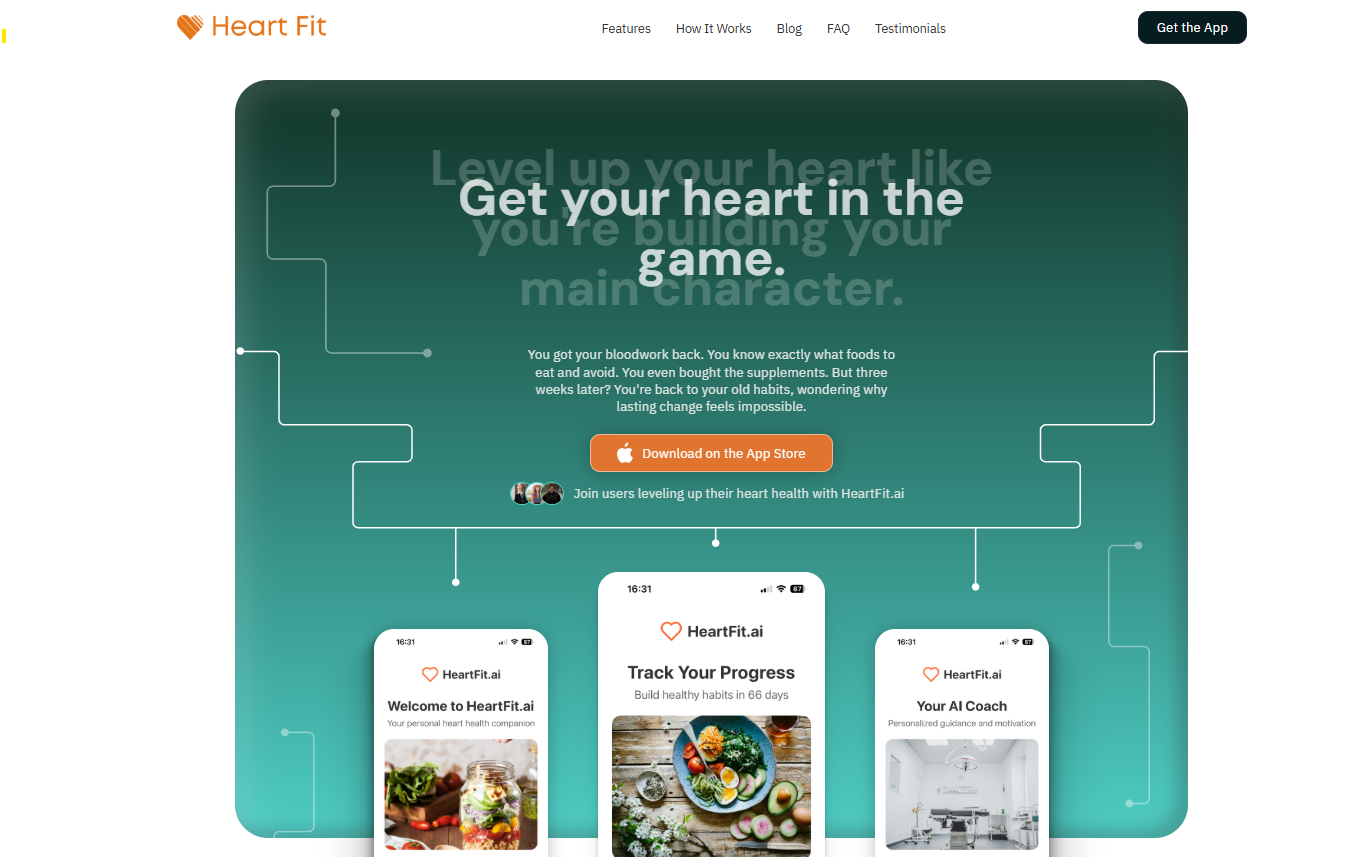
Its core strength lies in its AI-powered habit coaching, which gamifies the journey toward better heart health over a 66-day cycle—a duration supported by research published in the European Journal of Social Psychology for establishing new routines. Users follow a system of swipeable tasks, streaks, and points, which makes adherence feel less like a chore and more like an engaging challenge. One of its most innovative features is the AI meal scoring: simply snap a photo of your food, and the app provides instant feedback on how that meal aligns with your specific heart-health objectives. This real-time guidance empowers users to learn and adjust their choices on the fly. You can explore a more detailed breakdown of these tools and see how they work on the Heart Fit features page.
The platform also provides weekly progress reports and compassionate AI-driven nudges, helping users visualize their progress and stay on track even after a setback. While it is not a substitute for professional medical advice, HeartFit is an exceptional tool for translating that advice into sustainable, real-world action.
For users within the Apple ecosystem, the App Store is the essential starting point for discovering the best health tracking apps tailored to your needs. It's not a single app but a curated marketplace, providing a secure and vetted environment to find everything from advanced biomarker trackers to simple mindfulness tools. Its primary strength lies in its strict privacy standards and editorial curation.

Apple's clear privacy labels, detailing exactly what data an app collects, are a standout feature. This transparency is crucial when dealing with sensitive health information. Editorial collections like "Apps for a Healthy Lifestyle" often surface high-quality, effective apps you might otherwise miss. The integrated payment system also simplifies managing subscriptions.
Key Takeaway: The App Store provides a trusted, centralized hub for iOS users to find, evaluate, and download health apps with confidence, thanks to its emphasis on security and clear data privacy disclosures.
For the vast majority of Android users, the Google Play Store is the definitive gateway to finding the best health tracking apps. As the official marketplace, it offers an extensive catalog of options, from detailed nutritional analyzers to apps focused on sleep, activity, and mental wellness. Its main advantage is its sheer breadth of selection and its integration with the Android operating system, including the Health Connect feature.
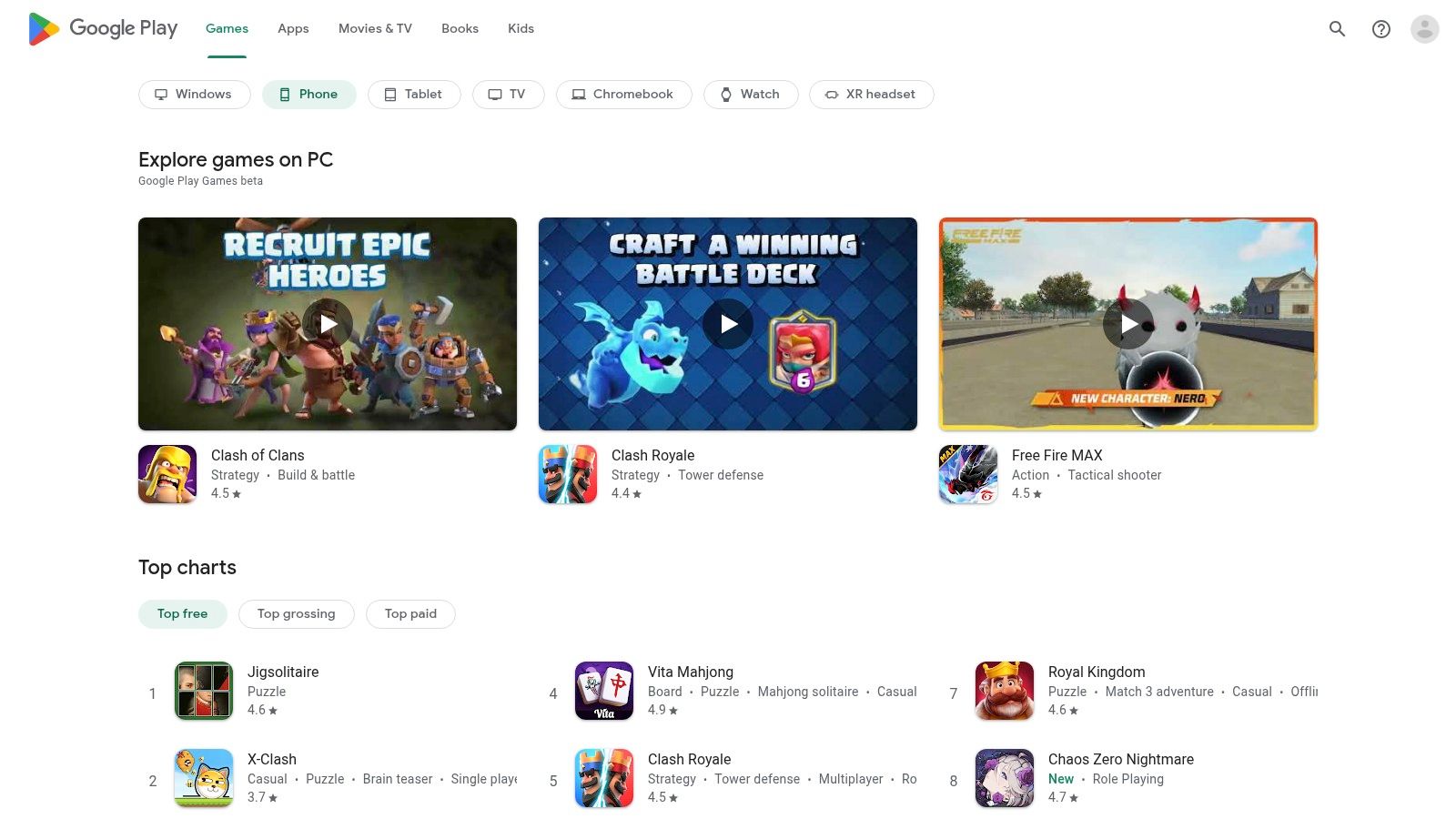
The Google Play Store's introduction of Health Connect is a significant step forward, allowing users to privately share data between their favorite health apps on-device. This improves data syncing and provides a more holistic view of your health without uploading everything to the cloud. User ratings, editor's picks, and clear subscription information help users make informed choices from a massive library of applications.
Key Takeaway: The Google Play Store serves as the essential, open ecosystem for Android users to discover a wide variety of health apps, with new tools like Health Connect enhancing data privacy and interoperability.
For iPhone users, Apple Health is the default, built-in hub for consolidating your wellness data. It functions as a secure digital dashboard, aggregating metrics from your iPhone, Apple Watch, and countless third-party apps and devices. Its strength is providing a single, unified view of your activity, sleep, nutrition, lab results, and mental health check-ins, making it one of the best health tracking apps for those already in the Apple ecosystem.
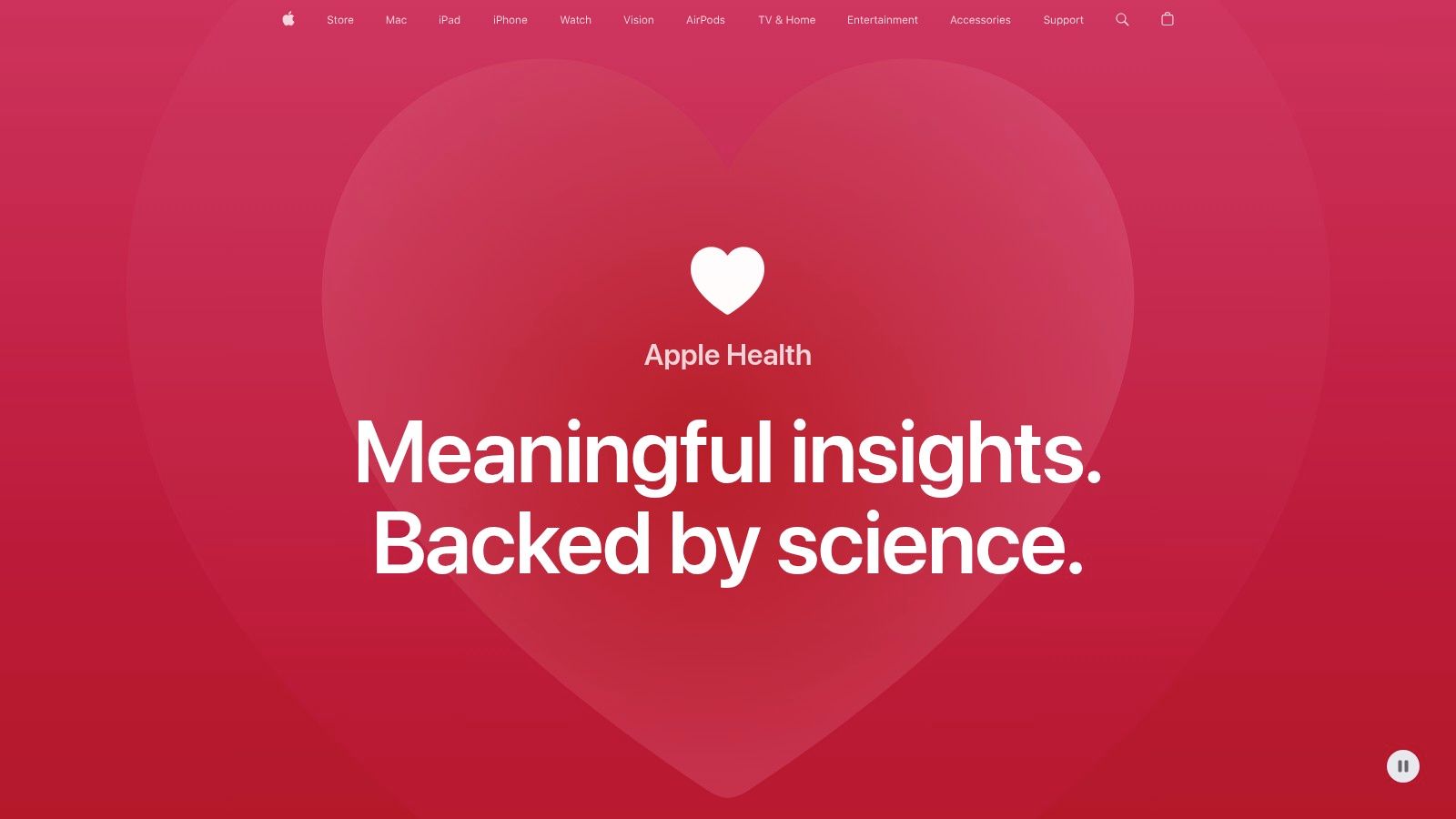
Apple Health excels at trend analysis, visualizing your long-term progress in areas like resting heart rate or walking steadiness. The ability to securely share specific data with family or healthcare providers is a powerful feature for collaborative care. It also includes practical tools for medication reminders and cycle tracking, with strong privacy controls like on-device processing and end-to-end iCloud encryption.
Key Takeaway: Apple Health is an exceptional, no-cost starting point for iPhone users to securely centralize health data, monitor trends, and share information, serving as the foundational layer for a comprehensive digital health record.
For Android users, especially those with Samsung Galaxy devices, Samsung Health is the native powerhouse platform for comprehensive wellness monitoring. It integrates seamlessly with wearables like the Galaxy Watch and the upcoming Galaxy Ring to track activity, sleep, and stress levels. Its strength lies in its deep hardware integration, offering advanced features like ECG monitoring (where available) and a growing suite of guided programs.
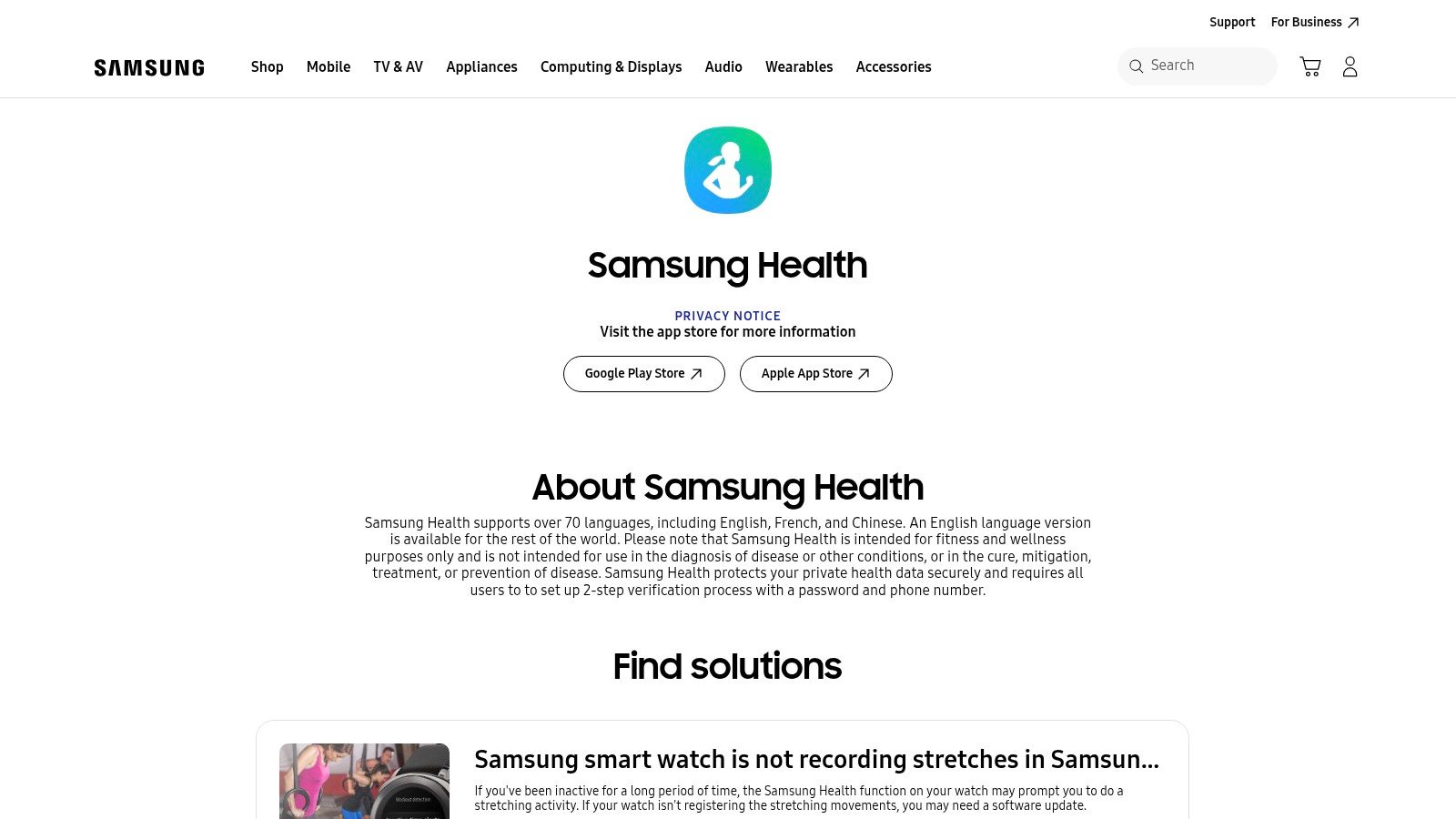
Samsung Health consolidates a wide array of health data into a single, user-friendly dashboard. Features like advanced sleep coaching and community challenges provide actionable insights and motivation to improve daily habits. The platform is also expanding into virtual care, with integrations like FindCare for telehealth visits in the U.S., making it a more holistic health hub. While it’s one of the best health tracking apps for the Android ecosystem, its most advanced features are often reserved for users with the latest Samsung devices.
Key Takeaway: Samsung Health offers a robust, integrated tracking experience for Android users, providing deep insights from wearables and serving as a central hub for activity, sleep, and even clinical connections.
As one of the most recognizable names in wearable technology, Fitbit provides a mainstream, user-friendly entry point into health monitoring. The platform, now owned by Google, combines its popular trackers and smartwatches with a comprehensive app that monitors activity, sleep, and readiness. It excels at making daily health data accessible and easy to understand for beginners.
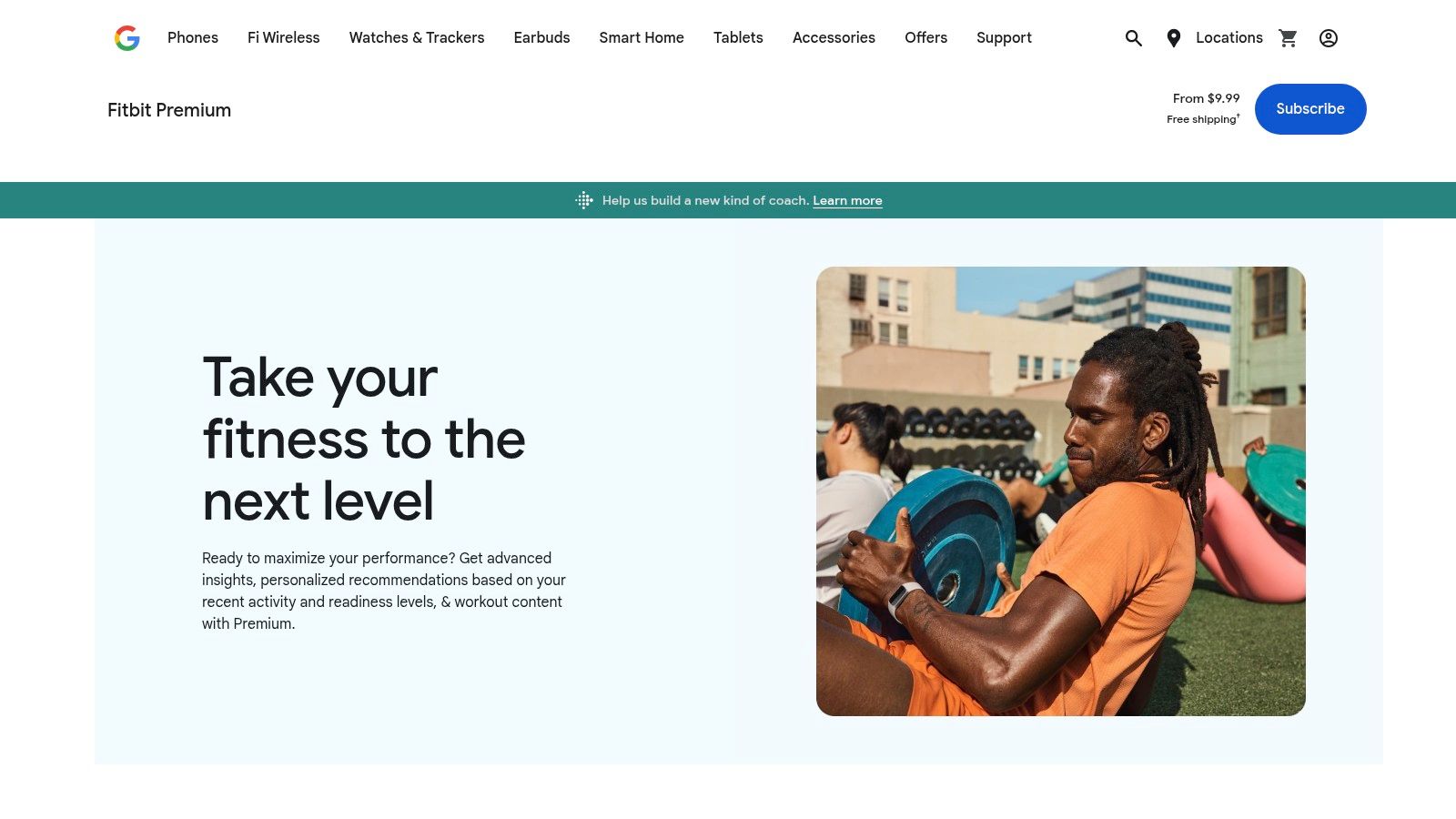
Fitbit's strength lies in its tightly integrated hardware and software ecosystem. The free app covers all the basics, from step counting to sleep stages. Upgrading to Fitbit Premium unlocks deeper analytics, such as the Daily Readiness Score, which advises on whether to push for a workout or prioritize recovery. Premium also offers a library of guided workouts and mindfulness sessions, making it one of the best health tracking apps for those who want an all-in-one solution. The large user community also adds a motivating social and competitive element.
Key Takeaway: Fitbit offers a polished and motivating experience, particularly for those new to health tracking, by seamlessly connecting a physical device to a data-rich app with powerful premium features.
For users of Garmin wearables, Garmin Connect is the command center for all performance and health data. While often associated with elite athletes, it has evolved into one of the best health tracking apps for everyday wellness, offering deep insights into sleep, stress, and heart metrics. Its strength is transforming raw sensor data into actionable feedback on training readiness and daily recovery.
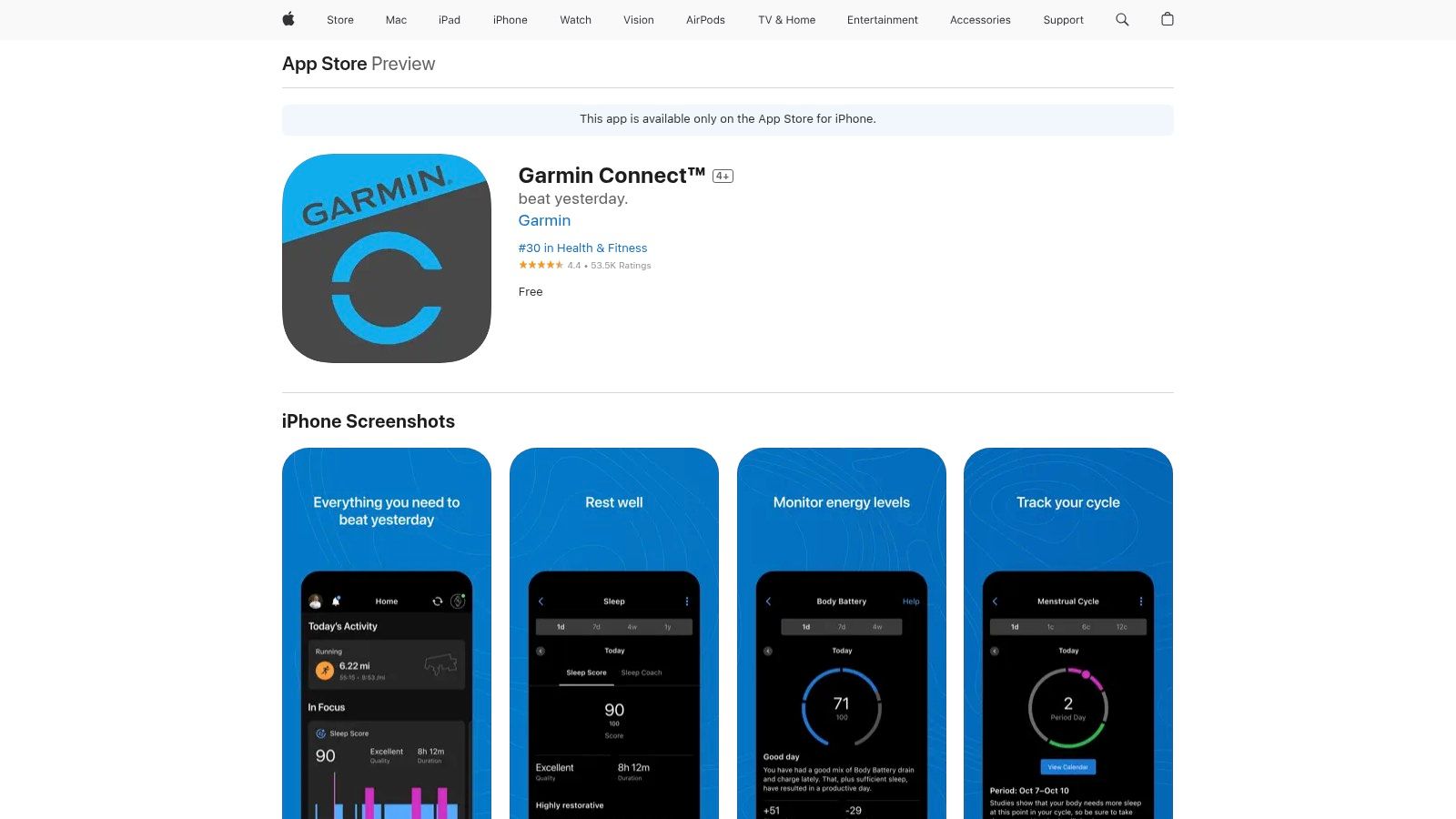
Garmin Connect excels at providing a holistic view of your physical state through features like Body Battery, which estimates your energy reserves. The platform's detailed activity analytics are second to none for runners and cyclists, offering advanced metrics like VO2 max and training load. While the core app is free, the new Garmin Connect Plus tier introduces AI-powered insights for users seeking deeper, personalized guidance. Integrations with apps like MyFitnessPal and Apple Health complete the ecosystem.
Key Takeaway: Garmin Connect is an indispensable tool for Garmin device owners, offering unparalleled athletic performance tracking and robust daily health monitoring features that connect activity, sleep, and stress.
For athletes who thrive on social motivation and performance data, Strava is the leading platform for tracking runs, rides, and a multitude of other activities. It transforms solo workouts into community experiences with its powerful route planning, competitive segments, and social sharing features. Its core strength lies in its massive, active user base and robust third-party device integrations.

Strava stands out by making fitness a shared journey. Its signature "Segments" allow users to compete for the best times on specific stretches of road or trail, adding a gamified layer to training. Features like heatmaps help you discover popular and safe routes, while Beacon allows you to share your live location with contacts for safety. This focus on community and performance makes it one of the best health tracking apps for dedicated athletes.
Key Takeaway: Strava excels at adding a competitive and social dimension to activity tracking, making it an indispensable tool for runners and cyclists who are motivated by community engagement and performance metrics.
A true veteran in the digital health space, MyFitnessPal is one of the most recognized and widely used best health tracking apps for calorie and macronutrient logging. Its core strength is an extraordinarily vast food database, refined over years of user contributions and verification, making it simple to track meals via barcode scanning, manual entry, or its newer Meal Scan feature. It excels at providing a clear picture of caloric intake versus expenditure for weight management goals.
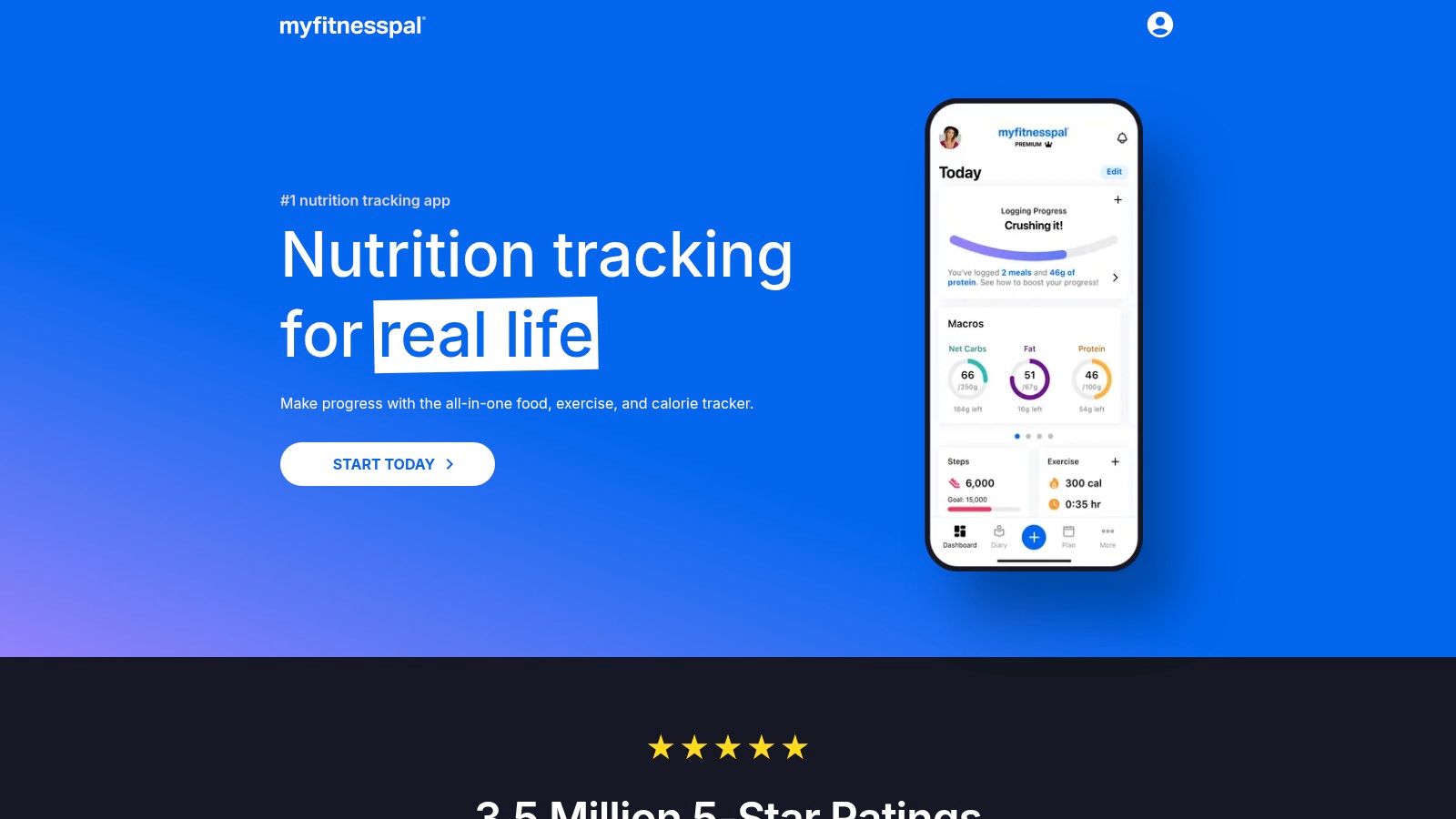
Beyond just calories, MyFitnessPal allows users to monitor macronutrients (protein, carbs, fats) and a range of micronutrients, which is vital for a heart-healthy diet. The platform integrates with hundreds of other fitness apps and devices, pulling in workout data to automatically adjust your daily calorie goals. For those needing more guidance, its premium tiers offer personalized meal plans and deeper nutritional insights. Its longevity and massive user base have created a robust and reliable tracking ecosystem.
Key Takeaway: MyFitnessPal offers a powerful, database-driven approach to food and exercise logging that is ideal for users focused on weight management and understanding the macronutrient composition of their diet.
For those who want to move beyond basic calorie counting, Cronometer offers a scientifically rigorous approach to nutrition. It is one of the best health tracking apps for detailed micronutrient analysis, allowing users to track up to 84 different vitamins, minerals, and compounds. Its strength lies in its high-quality, verified food database and its focus on providing a complete nutritional picture.
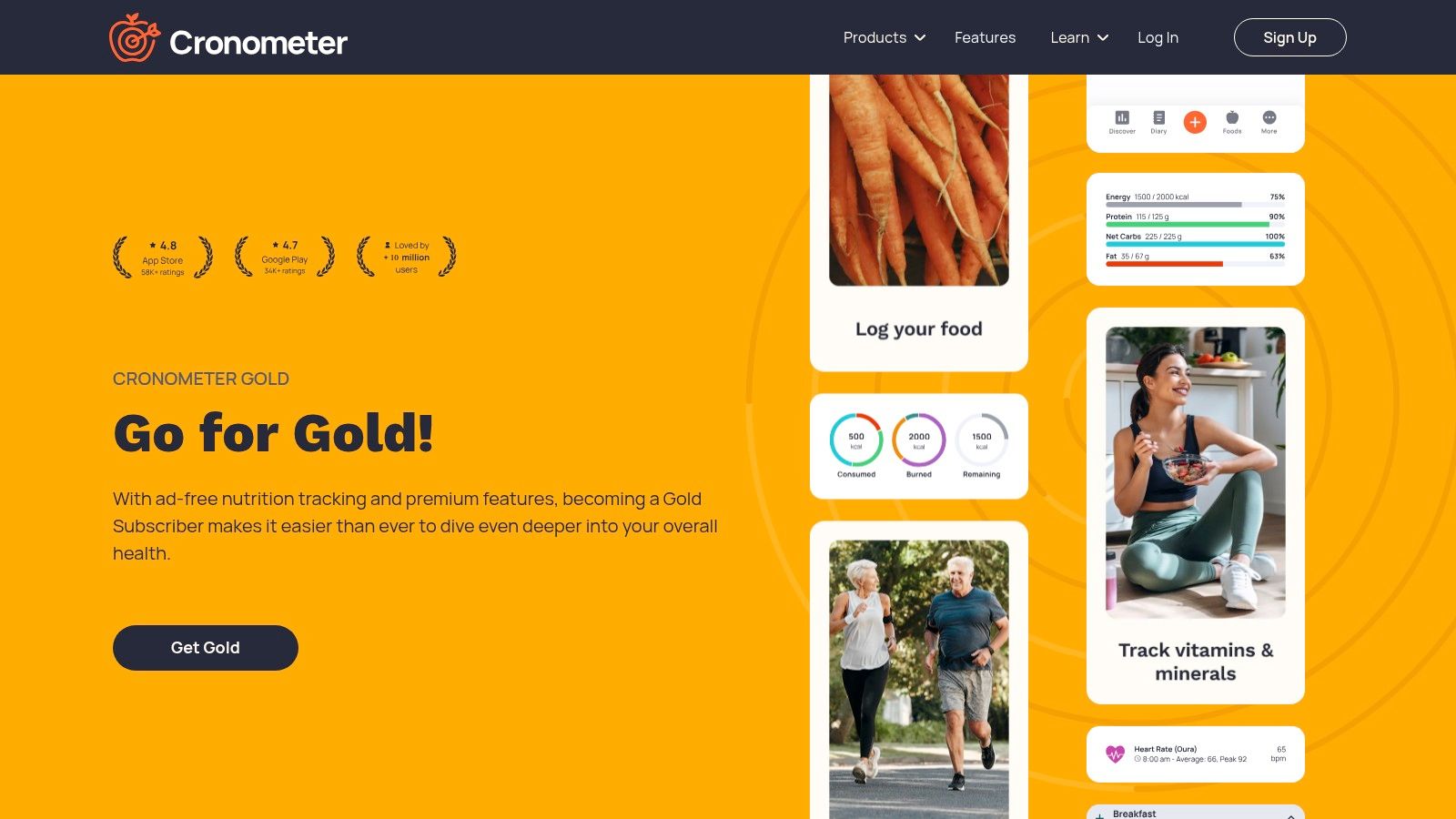
Cronometer's commitment to data accuracy sets it apart. The app's database is curated and transparent, giving users confidence in the nutritional information they log. It also allows for the tracking of custom biometrics, making it a valuable tool for monitoring how diet impacts specific health markers like blood pressure or cholesterol. This granular detail is essential for anyone on a therapeutic diet or fine-tuning their nutrition for optimal performance and heart health, particularly when paired with insights from at-home lab tests.
Key Takeaway: Cronometer provides unparalleled micronutrient detail and data transparency, making it the ideal tool for users who need precise, scientific-level insights into their dietary intake.
Oura stands out by shifting the focus from active workout tracking to passive recovery and sleep analysis via its smart ring. The companion app translates data from the Oura Ring into actionable insights, making it one of the best health tracking apps for those who prioritize understanding their body's readiness and sleep quality. It excels at delivering detailed metrics with minimal user effort.
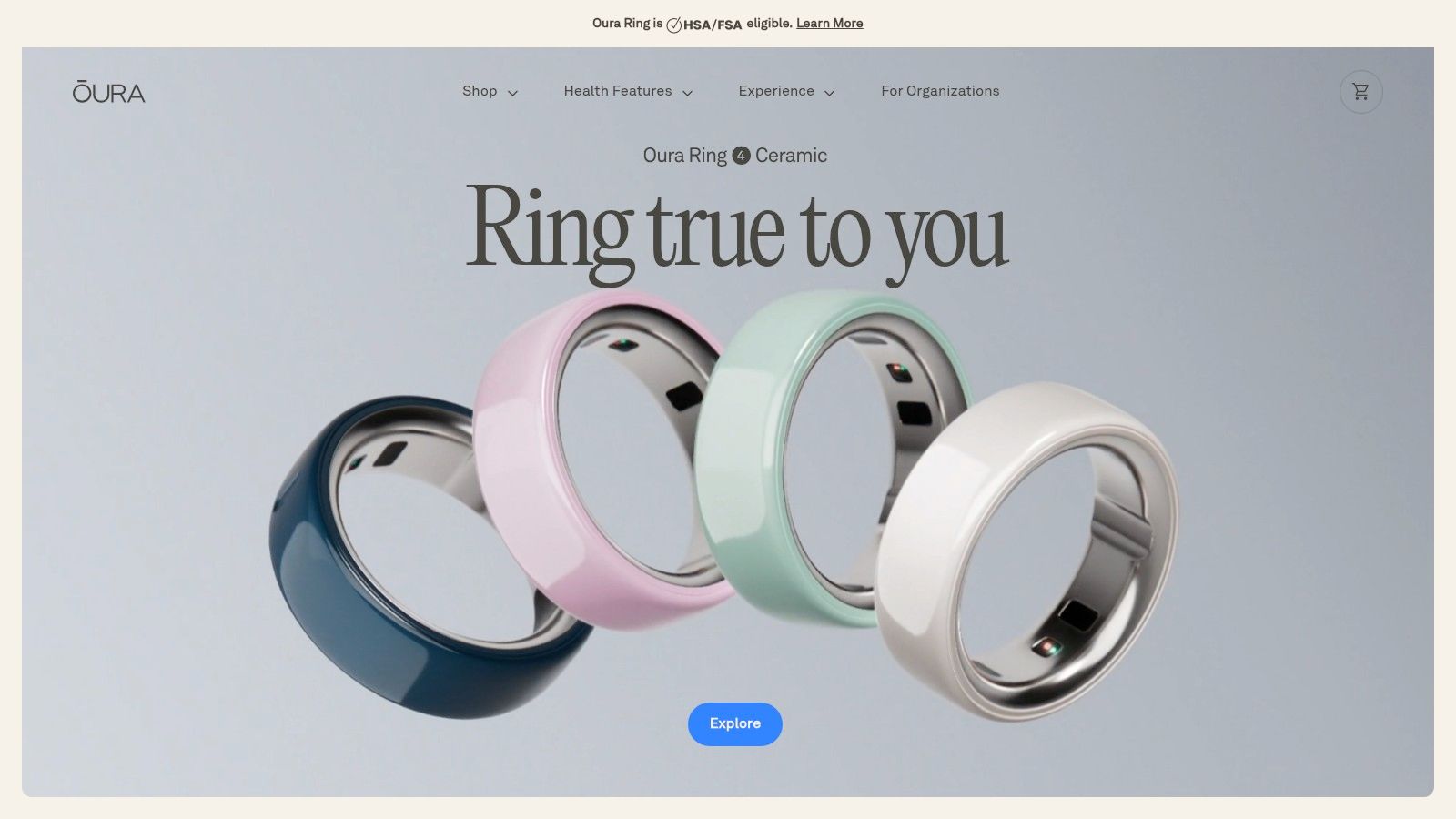
Oura’s strength lies in its sophisticated sleep stage tracking, heart rate variability (HRV), and body temperature trend analysis. These metrics feed into a daily "Readiness Score" that helps users decide whether to push hard or focus on recovery. A unique feature for U.S. users is Health Panels, which integrates lab biomarker data from Quest Diagnostics directly into the app, connecting your physiological trends with clinical results for a more complete health picture.
Key Takeaway: Oura provides a powerful, low-friction way to monitor sleep and recovery, with its Readiness Score offering clear, daily guidance on your body's capacity for strain.
For those invested in a holistic, device-driven approach to health monitoring, Withings' Health Mate app is the central nervous system for a powerful ecosystem. It seamlessly unifies data from Withings' range of smart scales, watches, blood pressure cuffs, and sleep trackers, creating a comprehensive longitudinal view of your health. Its strength lies in transforming raw hardware data into actionable, long-term health insights.
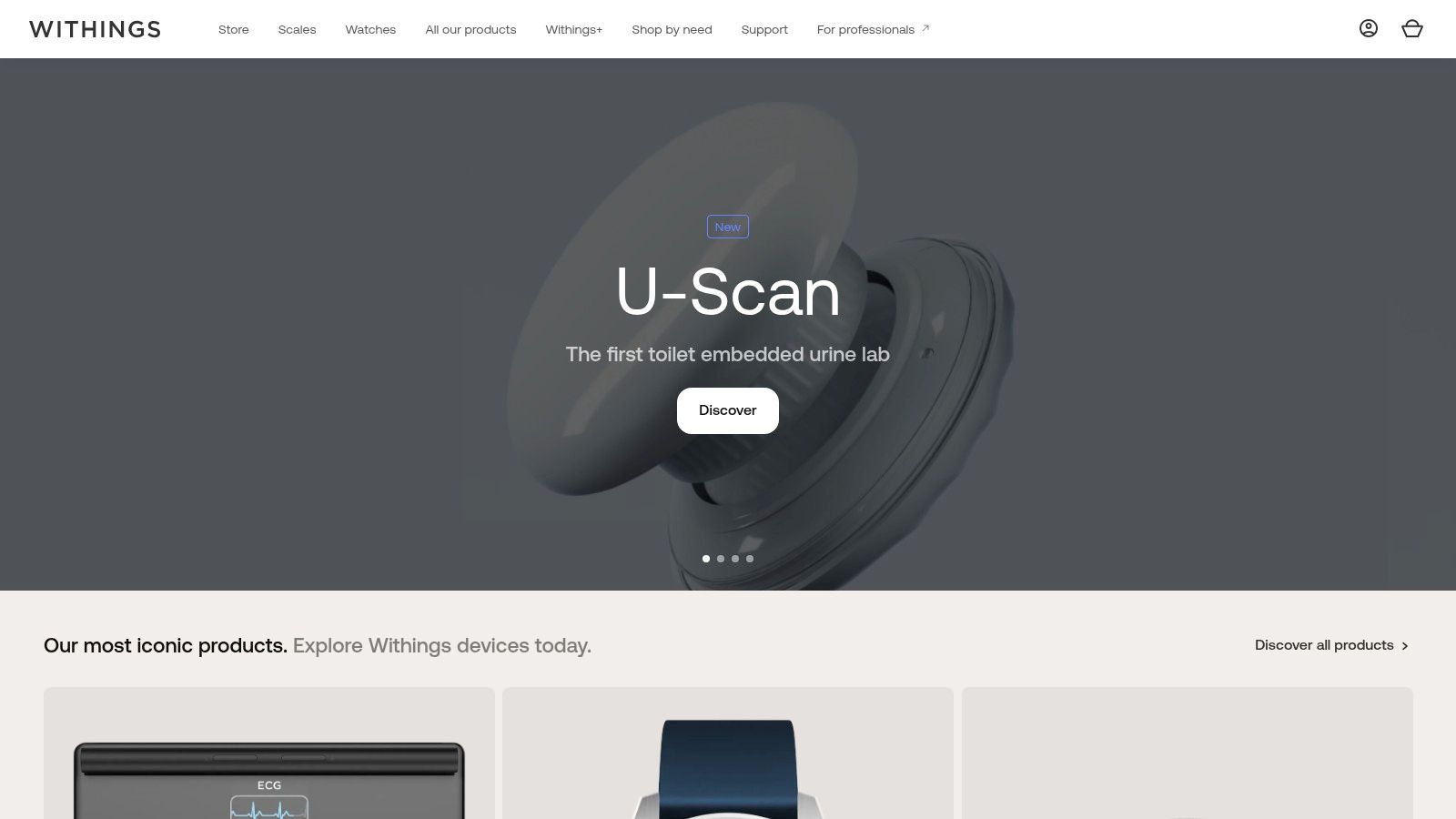
Health Mate excels at integrating diverse metrics like body composition, heart rate, ECG, and sleep quality into a single, intuitive dashboard. The platform is moving towards clinical-grade tracking with features like at-home urine analysis and optional cardiologist reviews of ECG readings. This makes it one of the best health tracking apps for users who want to connect physical device measurements with digital health trends over time.
Key Takeaway: Withings (Health Mate) offers unparalleled hardware and software integration, creating a detailed, multi-faceted picture of your health that bridges the gap between consumer wellness and clinical-level data monitoring.
HeartFit stands out by offering AI-powered meal photo scoring, bloodwork-based action plans, and a 66-day gamified habit system to help users establish sustainable heart-health habits. Its AI coach provides users with daily tasks, swipeable reports, and motivational nudges, making health improvement feel like an engaging challenge rather than a chore. The app’s primary audience is busy adults who need structured guidance to implement the health advice provided by clinicians. HeartFit is available on iOS with a 7-day free trial and a flexible pay-what-you-want monthly subscription.
The Apple App Store is a curated marketplace for discovering health tracking apps. It offers a secure environment with privacy labels and editorial collections, ensuring users can find effective apps. It’s particularly valuable for iPhone and iPad users, providing a seamless and familiar UI with integrated payments and family sharing. The platform’s strength lies in privacy transparency and curated collections that help users find trusted apps, with pricing varying by developer, often through one-time payments or subscriptions.
The Google Play Store provides an extensive catalog of health apps, benefiting Android users who are looking for a wide selection of tools for activity tracking, sleep monitoring, and mental wellness. The platform’s integration with Health Connect enhances data syncing across apps, allowing for a more holistic view of health. This makes it an ideal resource for Android users seeking diverse health apps, though app quality and privacy standards can vary significantly.
Apple Health serves as a central hub for consolidating health data, aggregating metrics from the iPhone, Apple Watch, and third-party apps. It excels in trend analysis, visualizing long-term progress across a range of metrics, from resting heart rate to sleep quality. It also enables secure sharing of data with family or healthcare providers and includes tools for medication reminders and cycle tracking, making it an excellent choice for iPhone and Apple Watch owners who want an integrated health dashboard. It is free and pre-installed on iOS devices.
Samsung Health is a comprehensive wellness monitoring platform, best suited for Galaxy device users. It tracks activity, sleep, and stress levels, and integrates with wearables like the Galaxy Watch and Galaxy Ring. Samsung Health stands out for its deep hardware integration, offering advanced features like ECG monitoring (on supported devices) and guided programs. The platform also provides community challenges for motivation and is expanding into virtual care, allowing users to access telehealth services like FindCare. Some features may be dependent on device model and region.
Fitbit offers a beginner-friendly health tracking ecosystem by combining its popular trackers and smartwatches with a comprehensive app. The free app covers all the basics, such as activity tracking, sleep stages, and Daily Readiness. Upgrading to Fitbit Premium unlocks deeper analytics and a library of guided workouts and mindfulness sessions. The app is ideal for those seeking an all-in-one solution to track fitness and wellness, with additional features available through a premium subscription.
Garmin Connect is designed for users with Garmin wearables, providing a holistic view of health with detailed training analytics, custom workouts, and performance metrics. Its most notable feature is Body Battery, which estimates your energy reserves. Garmin Connect excels at tracking advanced metrics like VO2 max and training load, making it particularly useful for runners, triathletes, and other serious athletes. While the core app is free, Garmin Connect Plus offers AI-powered insights for those seeking more personalized guidance.
Strava is ideal for athletes who thrive on social motivation and performance data. The app allows users to track runs, rides, and other activities, offering route planning, segments/leaderboards, and community challenges. Strava’s unique social feed and performance metrics make it a go-to for runners and cyclists looking for community engagement and competition. Some of Strava’s most valuable features, like advanced analytics and route planning, are behind a subscription paywall.
MyFitnessPal has become a leader in calorie and macronutrient tracking, offering a vast food database and integration with many fitness apps. The app allows users to log meals using barcode scanning, manual entry, or the newer Meal Scan feature. It excels at providing a clear picture of caloric intake vs. expenditure, making it ideal for weight management and nutrition tracking. The premium version offers personalized meal plans and deeper nutritional insights.
Cronometer is a scientifically rigorous app that goes beyond basic calorie counting, providing detailed analysis of micronutrients. It tracks 84 different vitamins, minerals, and compounds, giving users a comprehensive picture of their nutritional intake. Cronometer is highly valued for its data accuracy and its ability to track custom biomarkers, making it ideal for users focused on precision nutrition and heart health. It’s especially useful for those following a therapeutic diet.
Oura focuses on sleep recovery and readiness analysis via its smart ring. It provides detailed insights into sleep stages, heart rate variability (HRV), and body temperature trends. The Readiness Score helps users understand their body’s capacity for physical strain and recovery. Oura also integrates with health panels that connect your biomarker data to trends, offering a more complete view of your health. It requires the purchase of the Oura Ring and a monthly membership.
Withings Health Mate integrates with a range of Withings devices to provide a holistic view of your health, including heart rate, ECG, sleep quality, and body composition. The app is designed to connect hardware data with long-term health trends, offering insights into various metrics like weight, blood pressure, and cardiovascular health. Its advanced features are available through the Withings+ subscription, making it ideal for users invested in device-driven health monitoring.
Navigating the landscape of the best health tracking apps can feel overwhelming, but the journey to find the right tool is a crucial step toward proactive health management. As we've explored, the ideal app is not a one-size-fits-all solution; it's a deeply personal choice that hinges on your unique goals, current health status, and the ecosystem of devices you already use.
The key takeaway is to align your choice with your primary objective. For elite athletes or those training for a specific event, the granular performance metrics from platforms like Garmin Connect and the social motivation of Strava are hard to beat. If your focus is on meticulous nutrition tracking and understanding every micronutrient, Cronometer offers an unparalleled level of detail. Meanwhile, foundational platforms like Apple Health and Samsung Health serve as excellent, centralized hubs for aggregating data from various sources.
Simply collecting data, however, is not the end goal. The true power of these tools is their ability to transform raw numbers into meaningful, actionable steps. This is where many apps fall short, leaving users with a dashboard full of metrics but no clear path forward. The most effective health journey involves translating information, such as the results from a recent blood panel showing elevated LDL cholesterol (the ‘bad’ kind), into concrete daily actions.
In short, a good app doesn't just show you data; it tells you what to do with it.
This is the critical gap that specialized apps like HeartFit are designed to fill. While a great fitness tracker can log your workouts, it may not connect that activity to your specific heart health goals as defined by your doctor. Your choice should reflect this need for translation. Ask yourself: do you need an app that just records your meals, or one that helps you build a heart-healthy diet based on recommendations from the American Heart Association?
Once you've made your selection, successful implementation comes down to consistency and mindful engagement. Here are a few final considerations:
Ultimately, the best health tracking app is the one you will use consistently. It should feel less like a chore and more like a supportive partner on your path to better health. Remember that these digital tools are designed to supplement, not replace, professional medical advice. Always consult your healthcare provider before making significant changes to your diet, exercise routine, or lifestyle.
Yes, many doctors recommend health tracking apps, especially for patients managing chronic conditions like diabetes or heart disease. These apps can help track metrics like activity levels, nutrition, sleep, and blood pressure, providing valuable data that can support medical advice. Apps such as HeartFit offer integration with clinical health advice, while apps like Levels and Apple Health can provide real-time insights into metabolic health. However, it's important to note that while these apps provide useful insights, they should complement—not replace—professional medical care and advice.
According to the Mayo Clinic, a normal resting heart rate for most adults is between 60 and 100 beats per minute. However, factors like fitness level, medications, and age can affect this range. A lower resting heart rate often indicates more efficient heart function.
No. Health tracking apps are for informational and motivational purposes only. They cannot diagnose medical conditions. Any health concerns or unusual data, such as a persistently high heart rate or an irregular rhythm detected by a device, should be discussed with a qualified healthcare professional.
Accuracy varies depending on the app, the quality of the device's sensors (if using a wearable), and the type of data being tracked. For example, GPS-based distance tracking is generally quite accurate, while calorie burn estimates are less precise. It's best to focus on trends over time rather than exact numbers for any single day.
Ready to turn your health data into a clear, actionable plan? If you are focused on improving your heart health by translating clinical advice into daily habits, HeartFit is built for you. Move beyond simple tracking and start building a sustainable, heart-healthy lifestyle today. Discover how Heart Fit can guide your journey.